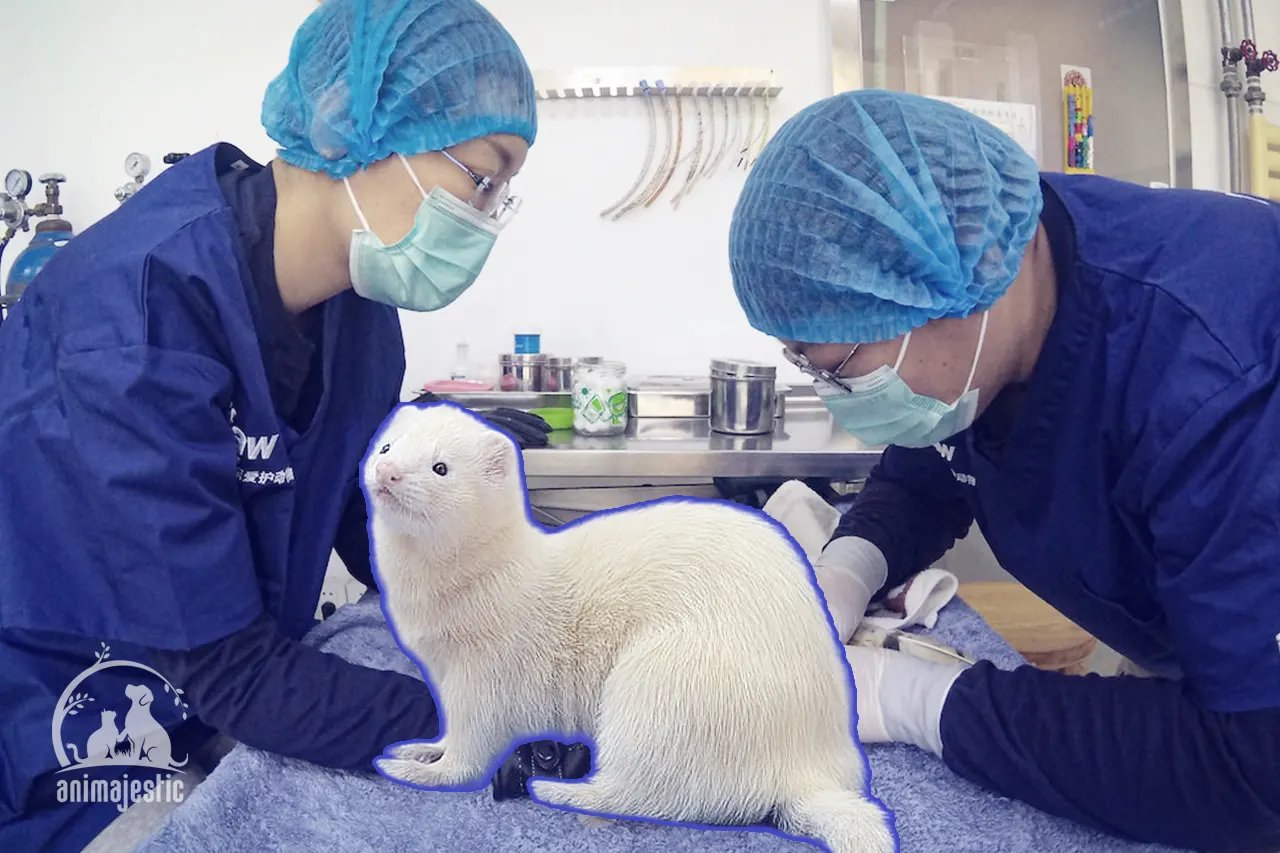Ferrets are beloved pets known for their playful nature, boundless energy, and distinctive appearance.
However, when considering bringing a ferret into your family, it is crucial to be aware of the common health issues in ferrets. Like any pet, ferrets have unique health needs, and their long and lean bodies make them susceptible to certain diseases.
This extensive guide will help you become knowledgeable about these potential health issues, allowing you to establish a safe, healthy environment for your ferret.
Common Health Issues In Ferrets
Understanding the different types of health issues that can affect your ferret is a significant part of responsible pet ownership.
1. Adrenal Disease
Adrenal disease is quite common among ferrets, particularly domestic ferrets older than three years. The adrenal glands are small glands located near the kidneys and are responsible for producing various vital hormones.
Unfortunately, these glands can sometimes overproduce these hormones leading to adrenal disease.
Symptoms
Look out for signs such as:
- Hair loss, beginning at the tail and progressing to the rest of the body
- Itching and scratching
- Increased aggression or unusual sexual behavior
- Enlarged vulva in females
- Difficult or painful urination in males
Treatment
The treatment methodology depends on the status of the disease and can range from a hormonal medication meant to block the overproduction of hormones to surgery for removing the affected gland.
2. Insulinoma
Insulinoma is a pancreatic disease and a form of ferret cancer. The condition occurs when tumors form in the pancreas, causing excessive insulin production, leading to dangerously low blood sugar levels.
Symptoms
Signs can be subtle and may include:
- Sudden weakness or lethargy
- Drooling
- Loss of appetite
- Confusion and pawing at the mouth
Treatment
Managing insulinoma is a delicate balance between maintaining the ferret’s blood sugar levels and mitigating excessive insulin production. Treatments typically include a combination of diet control, medication, and possibly surgery.
3. Dental Disease
With continuous mastication, ferrets can develop dental problems over time. Periodontal disease and gingivitis are the most common dental issues. Regular dental care, including brushing your ferret’s teeth and providing a proper diet, can help prevent oral complications.
Symptoms
Symptoms of dental disease in ferrets might comprise:
- Bad breath
- Decreased appetite
- Red, swollen, or bleeding gums
- Loose teeth or tooth loss
Treatment
Your vet may need to execute dental cleaning under anesthesia, followed by antibiotics and pain medication. Regular brushing and a proper diet can prevent these issues from recurring.
4. Gastrointestinal Diseases
Ferrets have rather lively, curious natures, which often leads them to chew on non-food items, causing gastrointestinal blockages. This condition can quickly become dire without immediate treatment.
Symptoms
Watch for signs such as:
- Loss of appetite
- Vomiting
- Diarrhea or constipation
- Unexplained weight loss
Treatment
A vet’s intervention is immediately required as surgery may be necessary to remove the obstruction. Regular monitoring of your ferret’s behavior and environment-proofing can prevent such occurrences.
5. Influenza
Interestingly, ferrets are susceptible to certain human illnesses, including the common flu.
Symptoms
Monitor for signs such as:
- Fever
- Sneezing
- Coughing
- Loss of appetite
Treatment
Like humans, ferrets require rest, hydration, and a healthy diet when dealing with the flu virus. In severe cases, your vet may prescribe antiviral medication.
6. Heart Disease
Heart disease is not uncommon in older ferrets, and it can often go unnoticed until it becomes severe.
Symptoms
Indications may include:
- Difficulty breathing
- Decreased activity or energy levels
- Sudden weight loss
- Swelling in the abdomen due to accumulated fluid
Treatment
Treatments may range from administering medication to manage symptoms to surgery in severe cases. Regular veterinary check-ups can help detect heart disease early and increase the success rate of treatments.
Conclusion
Ferrets, while small, require tremendous amounts of care and attention, particularly when it comes to their health. Regular health checkups, a balanced diet, and a safe environment significantly contribute to the overall well-being of your ferret.
Equipped with clear, up-to-date knowledge of common ferret health issues, you are now better prepared to notice any signs of illness in your ferret, ensuring they receive appropriate treatment at the right time.
Through accurate, comprehensive understanding and attentive care, you can ensure a prosperous, exciting life for your ferret.
